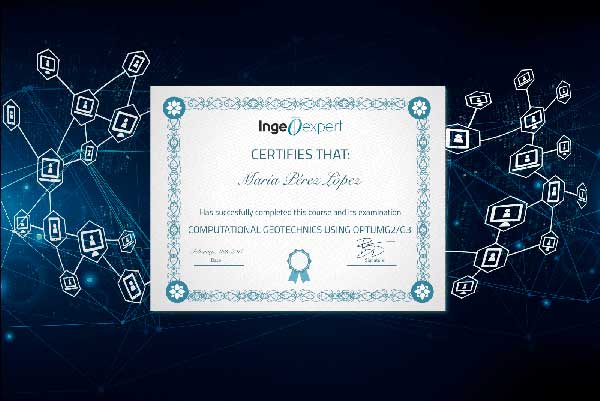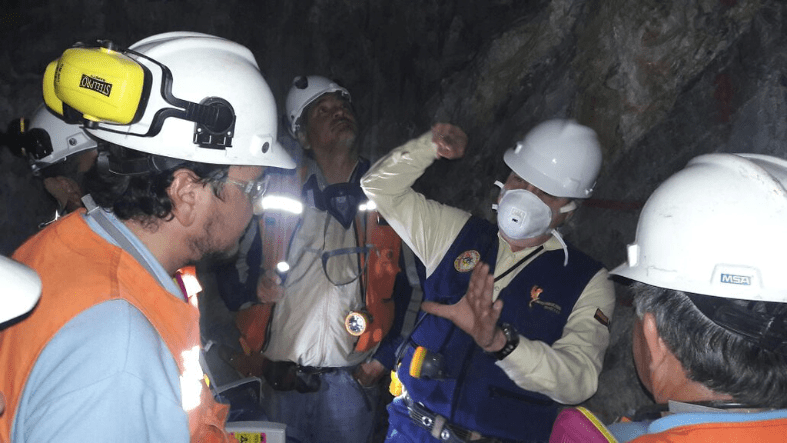How to extract as much information as possible from your geochemical data
Online course |
|
50 hours / 6 weeks |
|
To be determined |
Introduction
All the “easy-to-find” deposits have already been – for the most part – found. That is why new research methods, new laboratory analytical techniques, Machine Learning and Artificial Intelligence methods, among others, are so necessary to help us in the task of finding our next deposits. In this course you will find all this, from how to take a correct sample to how to interpret and represent it in a way that is easy to understand.
Objectives
- To prepare recent graduates or graduating students for an easier and more efficient transition to the work of mining companies.
- To introduce new sampling techniques.
- To ensure better application of QA/QC rules.
- To introduce the use of methods such as compositional analysis of data, AA and IA, etc. In geological practice.
- To introduce the method of “quantum” geochemistry in the graphical representation of its results.
Limited places.
Module 1. What methods to use? – According to the type of mineralization being sought, terrain characteristics, level of study, available budget, and other factors, we will show which are the most appropriate geochemical methods in each situation.
Module 2. What laboratories and analytical techniques to use? – Total or partial digestion? Certified or non-certified laboratory? We will explain what is sought to be achieved with different methods of sample preparation and different types of analysis. We will also delve into the concepts of certified laboratories, Round-robins, arbitration laboratories, etc.
Module 3. The importance of Quality Control and Quality Assurance (QA/QC) – we will emphasize quality assurance and all the quality control techniques and results analysis that allow validation of the database to be used in subsequent work.
Module 4. Data processing – this is the most comprehensive part of the course, starting with data preparation and cleaning, various rarely used techniques such as Clarke analysis, determination of erosion level, RCC (range-l correlation coefficient), and then entering the statistics of closed data (compositional analysis of data), the use of machine learning, and other advanced techniques that will allow you to extract ALL the useful information from your data.
Module 5. Graphic representation of results – using mainly SURFER as the graphing program, we will explain in detail the use of the software, the importance and usefulness of variograms, and introduce a new method (quartile analysis) that will allow you to create geochemical “quantum” maps so effective that even a novice could interpret them.
Ricardo Valls
Mr. Ricardo Valls, P. Geo. and M. Sc., is a professional geologist with over 37 years of experience in the international mining industry. P. Geo. Valls has extensive experience in geological and geochemical surveys, mining activities, as well as leadership experience and a strong foundation in scientific research and technical personnel training. P. Geo. Valls has been involved in several projects in various countries (Canada, Africa, Russia, Argentina, Haiti, Cuba, Indonesia, and other Central and South American countries). These projects range from regional surveys to local mapping, diamond and reverse circulation drilling, quarry and mine mapping, sampling and interpretation of geochemical surveys, as well as several other exploration techniques related to the search for diamond, PGM, gold, nickel, silver, base metals, industrial minerals, oil and gas, emeralds, rubies, as well as other types of magmatic, hydrothermal, porphyry, VMS, and SEDEX deposits. Engineer Valls has extensive experience in geological and geochemical studies, project organization and management, geomathematical analysis and modeling, lineament studies, QA&QC studies, exploration work and technical report writing. He is also the author of several books on geology, geochemistry, compositional data analysis, QA&QC, AI and ML, etc. Ricardo Valls is also a Registered P. Geo. in the province of Ontario, Canada.
The course is delivered online through our easy-to-use Virtual Campus platform. For this course, a variety of content is provided including:
– eLearning materials
– Videos
– Interactive multimedia content
– Live webinar classes
– Texts and technical articles
– Case studies
– Assignments and evaluation exercises
Students can download the materials and work through the course at their own pace.
We regularly update this course to ensure the latest news and state-of-the-art developments are covered, and your knowledge of the subject is current.
Live webinars form part of our course delivery. These allow students and tutors to go through the course materials, exchange ideas and knowledge, and solve problems together in a virtual classroom setting. Students can also make use of the platform’s forum, a meeting point to interact with tutors and other students.
The tutoring system is managed by email. Students can email the tutor with any questions about the course and the tutor will be happy to help.
The course is aimed at a broad group, from final-year students to experienced professionals. A minimum knowledge of statistics and Excel handling is assumed. It would be very useful to have basic knowledge of SURFER (www.goldensoftware.com).
Other software that will be introduced does not require prior preparation, and it is precisely one of the objectives of the course to introduce them into daily geological practice.
Once a student finishes the course and successfully completes the assignments and evaluation tests, they are sent an accreditation certificate. The certificate is issued by Ingeoexpert to verify that the student has passed the course. It is a digital certificate that is unique and tamper-proof – it is protected by Blockchain technology. This means it is possible for anyone to check that it is an authentic, original document.
You will be able to download the certificate in an electronic format from the Virtual Campus platform. The certificate can be forwarded by email, shared on social networks, and embedded on websites. To see an example, click here.
The application of these methods will open doors to any mining company interested in exploration tasks, practically at all levels of project development. You will be able to apply the acquired knowledge from planning the most effective methods for mineralization search, to the most modern techniques for processing data and representing results to locate drilling holes to discover new mineral bodies. If you work in academia, the techniques of compositional data analysis and machine learning methods will be very useful in your academic development.
Introduction
All the “easy-to-find” deposits have already been – for the most part – found. That is why new research methods, new laboratory analytical techniques, Machine Learning and Artificial Intelligence methods, among others, are so necessary to help us in the task of finding our next deposits. In this course you will find all this, from how to take a correct sample to how to interpret and represent it in a way that is easy to understand.
Objectives
- To prepare recent graduates or graduating students for an easier and more efficient transition to the work of mining companies.
- To introduce new sampling techniques.
- To ensure better application of QA/QC rules.
- To introduce the use of methods such as compositional analysis of data, AA and IA, etc. In geological practice.
- To introduce the method of “quantum” geochemistry in the graphical representation of its results.
Limited places.
Module 1. What methods to use? – According to the type of mineralization being sought, terrain characteristics, level of study, available budget, and other factors, we will show which are the most appropriate geochemical methods in each situation.
Module 2. What laboratories and analytical techniques to use? – Total or partial digestion? Certified or non-certified laboratory? We will explain what is sought to be achieved with different methods of sample preparation and different types of analysis. We will also delve into the concepts of certified laboratories, Round-robins, arbitration laboratories, etc.
Module 3. The importance of Quality Control and Quality Assurance (QA/QC) – we will emphasize quality assurance and all the quality control techniques and results analysis that allow validation of the database to be used in subsequent work.
Module 4. Data processing – this is the most comprehensive part of the course, starting with data preparation and cleaning, various rarely used techniques such as Clarke analysis, determination of erosion level, RCC (range-l correlation coefficient), and then entering the statistics of closed data (compositional analysis of data), the use of machine learning, and other advanced techniques that will allow you to extract ALL the useful information from your data.
Module 5. Graphic representation of results – using mainly SURFER as the graphing program, we will explain in detail the use of the software, the importance and usefulness of variograms, and introduce a new method (quartile analysis) that will allow you to create geochemical “quantum” maps so effective that even a novice could interpret them.
Ricardo Valls
Mr. Ricardo Valls, P. Geo. and M. Sc., is a professional geologist with over 37 years of experience in the international mining industry. P. Geo. Valls has extensive experience in geological and geochemical surveys, mining activities, as well as leadership experience and a strong foundation in scientific research and technical personnel training. P. Geo. Valls has been involved in several projects in various countries (Canada, Africa, Russia, Argentina, Haiti, Cuba, Indonesia, and other Central and South American countries). These projects range from regional surveys to local mapping, diamond and reverse circulation drilling, quarry and mine mapping, sampling and interpretation of geochemical surveys, as well as several other exploration techniques related to the search for diamond, PGM, gold, nickel, silver, base metals, industrial minerals, oil and gas, emeralds, rubies, as well as other types of magmatic, hydrothermal, porphyry, VMS, and SEDEX deposits. Engineer Valls has extensive experience in geological and geochemical studies, project organization and management, geomathematical analysis and modeling, lineament studies, QA&QC studies, exploration work and technical report writing. He is also the author of several books on geology, geochemistry, compositional data analysis, QA&QC, AI and ML, etc. Ricardo Valls is also a Registered P. Geo. in the province of Ontario, Canada.
The course is delivered online through our easy-to-use Virtual Campus platform. For this course, a variety of content is provided including:
– eLearning materials
– Videos
– Interactive multimedia content
– Live webinar classes
– Texts and technical articles
– Case studies
– Assignments and evaluation exercises
Students can download the materials and work through the course at their own pace.
We regularly update this course to ensure the latest news and state-of-the-art developments are covered, and your knowledge of the subject is current.
Live webinars form part of our course delivery. These allow students and tutors to go through the course materials, exchange ideas and knowledge, and solve problems together in a virtual classroom setting. Students can also make use of the platform’s forum, a meeting point to interact with tutors and other students.
The tutoring system is managed by email. Students can email the tutor with any questions about the course and the tutor will be happy to help.
The course is aimed at a broad group, from final-year students to experienced professionals. A minimum knowledge of statistics and Excel handling is assumed. It would be very useful to have basic knowledge of SURFER (www.goldensoftware.com).
Other software that will be introduced does not require prior preparation, and it is precisely one of the objectives of the course to introduce them into daily geological practice.
Once a student finishes the course and successfully completes the assignments and evaluation tests, they are sent an accreditation certificate. The certificate is issued by Ingeoexpert to verify that the student has passed the course. It is a digital certificate that is unique and tamper-proof – it is protected by Blockchain technology. This means it is possible for anyone to check that it is an authentic, original document.
You will be able to download the certificate in an electronic format from the Virtual Campus platform. The certificate can be forwarded by email, shared on social networks, and embedded on websites. To see an example, click here.
The application of these methods will open doors to any mining company interested in exploration tasks, practically at all levels of project development. You will be able to apply the acquired knowledge from planning the most effective methods for mineralization search, to the most modern techniques for processing data and representing results to locate drilling holes to discover new mineral bodies. If you work in academia, the techniques of compositional data analysis and machine learning methods will be very useful in your academic development.
More info
Finish this course and get a certificate based on Blockchain
How to extract as much information as possible from your geochemical data

Blockchain technology makes the certificate incorruptible, enabling companies to verifiy its autenticity.





Reviews
There are no reviews yet.